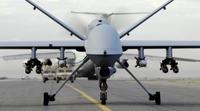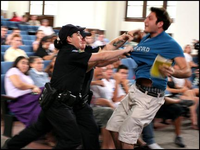-
NYPD AW119 fleet achieves 20,000 hour milestone
The NYPD has four AW119 helicopters in service; the department’s first AW119 entered service in 2004; the NYPD has become the worldwide law enforcement fleet leader, having achieved more than 20,000 flying hours on the fleet
-
-
Computer-based methodology for cultural intelligence and security
Cultural differences are a major challenge facing intelligence agencies, researchers from Israel and the United States have developed computer-based methodology to improve knowledge, apply data, and better decipher these nuances and biases
-
-
First successful "spoofing" of UAVs demonstrated

A research team successfully demonstrated for the first time that the GPS signals of an unmanned aerial vehicle (UAV), or drone, can be commandeered by an outside source — a discovery that could factor heavily into the implementation of a new federal mandate to allow thousands of civilian drones into the U.S. airspace by 2015
-
-
DARPA’s UAVForge shows challenge of developing perch and stare UAV
DARPA’s UAVForge is a crowdsourcing competition to design, build, and manufacture an advanced small UAV; the competition aims to determine whether a loosely-connected community of UAV enthusiasts could develop a militarily relevant back-pack portable UAV with specific capabilities
-
-
Tasers do not cause cardiac complications: study

Tasers are commonly used by law enforcement personnel worldwide as an intermediate-force option to subdue and apprehend potentially dangerous or combative suspects; tasers function by delivering a series of very brief high-voltage, low-current electric pulses that result in pain, muscle contraction and inhibition of voluntary movement; taser shots to the chest are no more dangerous than those delivered to other body locations, according to a new study
-
-
SFPD announce new mobile application for police in the field
Earlier this week Mayor Edwin Lee of San Francisco joined the San Francisco Police Department and San Francisco Citizens Initiative for Technology and Innovation (sf.citi) to announce a new mobile application which will enable police officers to report remotely from the field and share reports in real time, improving police department efficiency for officers by an estimated 40 percent daily
-
-
Biometrics proves 1 percent of applicants to enter U.S. are unsuitable
Chris Archer, the online content editor at IDGA (the Institute for Defense & Government Advancement), talked with James Loudermilk, Senior Level Technologist, FBI Science and Technology Branch, about biometrics and biometrics and homeland security; Loudermilk says that biometrics applications helped the FBI determine that about 1 percent of people who seek visa to visit the United States as tourists have previously done things that make them unsuitable guests; the conversation examines the application of biometrics for homeland security, issues relating to privacy and civil liberties, and what can be learned from international biometrics projects, including India’s UID scheme
-
-
Forensic research using DNA sequencing technology
The Ion Personal Genome Machine (PGM) Sequencer translates chemical sequencing information directly into digital form by using semiconductor technology; it enables the analysis of ninety-six samples in one run, allowing forensic practitioners to obtain more information from the samples they process; the sequencer is suitable for a wide array of forensic identification applications, including missing persons identifications, mass disaster work, interpretations of complex mixtures, and bio-defense
-
-
Researchers advance biometric security
Researchers have developed a way for security systems to combine different biometric measurements — such as eye color, face shape, or fingerprints — and create a learning system that simulates the brain in making decisions about information from different sources
-
-
New method uses gunshot residue to determine caliber, type of weapon used in crime
Researchers have developed a method to determine the caliber and type of weapon used in a crime by analyzing gunshot residue (GSR); using near-infrared (NIR) Raman microspectroscopy and advanced statistics, the new technique may play a pivotal role in law enforcement cases and forensic investigations
-
-
Smartphone app offers sex offender information
Two of the providers of technology to local sheriffs’ offices have announced a new content publishing agreement that will offer the public information on sex offenders
-
-
New device allows users to scale walls, mountain faces
A group of mechanical and aerospace engineering students, using engineering principles, basic math, and ingenuity, have designed a system which would enable special operations force personnel, first responders, and members of search and rescue teams to scale buildings or mountain faces under a variety of conditions
-
-
Lawmaker proposes restrictions on domestic drone use
Senator Rand Paul (R-Kentucky) on Tuesday introduced legislation into the Senate which he says aims to protect individual privacy against unwarranted governmental intrusion through the use of the unmanned aerial vehicles commonly known as drones
-
-
Day of wide-spread domestic drone use nears
So far, the U.S. Federal Aviation Administration( FAA) has issued 266 active testing permits for civilian-drone applications, but has yet to allow drones wide-scale access to U.S. airspace; law enforcement and industry officials say that it is only a matter of time before the FAA would allow the more than 18,000 law enforcement agencies and departments to begin to use drones for surveillance
-
-
Psychemedics receives additional FDA clearances for hair analysis drug testing
Psychemedics developed a technology, using FDA-cleared radioimmunoassays (RIA), for the detection of drugs of abuse, and says it was the first laboratory to receive FDA clearances ten years ago for screening assays used in hair testing for drugs of abuse; the technology detects cocaine, opiates, PCP, methamphetamine, and marijuana using enzyme immunoassay (EIA) analysis of head and body hair
-
- All
- Regional
- Water
- Biometrics
- Borders/Immig
- Business
- Cybersecurity
- Detection
- Disasters
- Government
- Infrastructure
- International
- Public health
- Public Safety
- Communication interoperabillity
- Emergency services
- Emergency medical services
- Fire
- First response
- IEDs
- Law Enforcement
- Law Enforcement Technology
- Military technology
- Nonlethal weapons
- Nuclear weapons
- Personal protection equipment
- Police
- Notification /alert systems
- Situational awareness
- Weapons systems
- Sci-Tech
- Sector Reports
- Surveillance
- Transportation
Advertising & Marketing: advertise@newswirepubs.com
Editorial: editor@newswirepubs.com
General: info@newswirepubs.com
2010-2011 © News Wire Publications, LLC News Wire Publications, LLC
220 Old Country Road | Suite 200 | Mineola | New York | 11501
Permissions and Policies
Editorial: editor@newswirepubs.com
General: info@newswirepubs.com
2010-2011 © News Wire Publications, LLC News Wire Publications, LLC
220 Old Country Road | Suite 200 | Mineola | New York | 11501
Permissions and Policies
